Best Chatbot for Enterprises to Automate Workflows
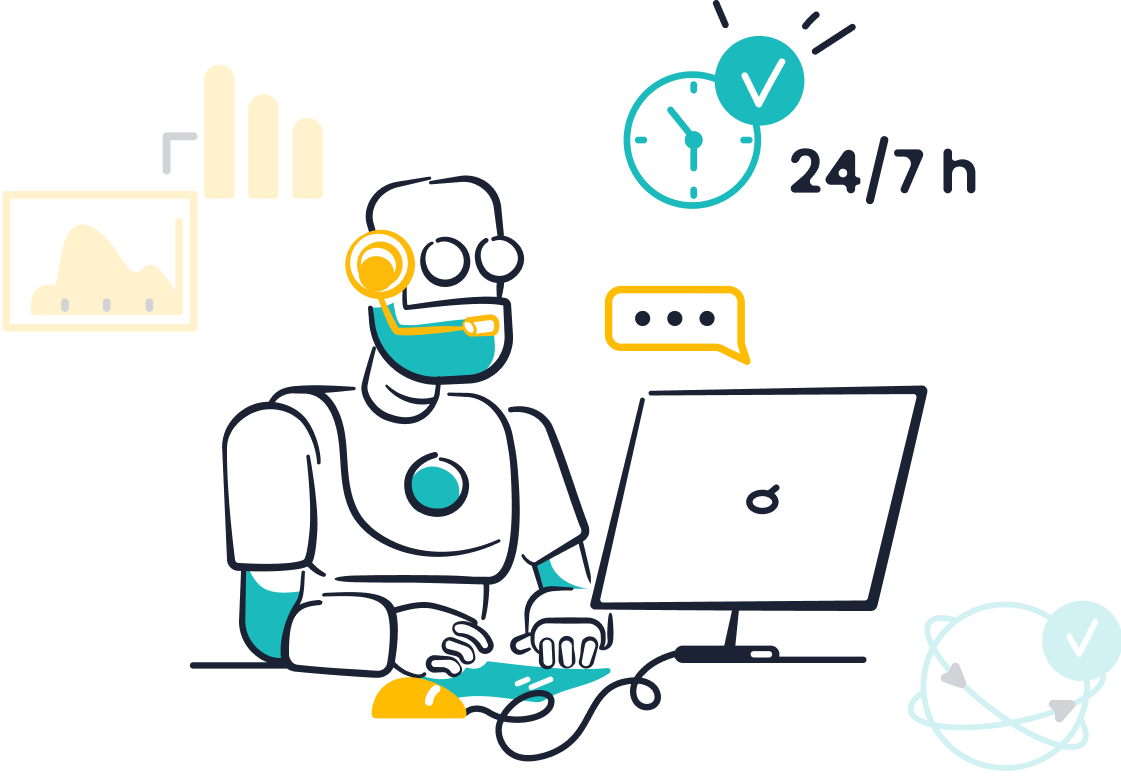
Sobot stands out as a leading chatbot for enterprises in 2025, delivering unmatched workflow automation and customer support. This chatbot platform empowers enterprise teams with AI-driven efficiency, handling 2.5 times more inquiries during peak periods and supporting over 20 languages. Sobot AI ensures 24/7 availability across channels, driving up to 80% higher conversion rates. OPPO’s adoption of this chatbot platform led to an 83% resolution rate and a 94% positive feedback score, proving the value of best ai chatbots for enterprise success. Companies seeking the best ai chatbot solutions trust Sobot for scalable, reliable automation.
Why Enterprises Need AI Chatbots
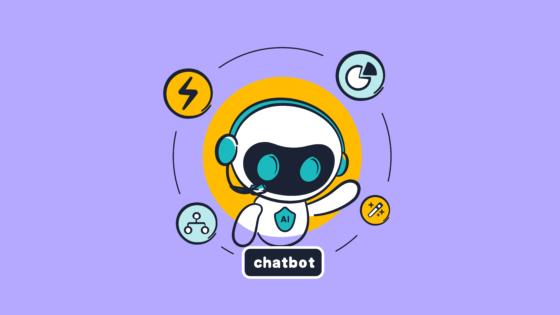
Workflow Automation Benefits
Enterprises face increasing pressure to streamline business operations and deliver faster service. AI chatbots help automate customer interactions, reducing manual workload and improving productivity. Companies report a 40% reduction in task completion time, such as marketing teams cutting content creation from 10 to 6 hours. AI chatbots resolve up to 79% of routine queries, freeing employees to focus on higher-value tasks. Sobot’s AI chatbot enables enterprises to automate repetitive processes, from order processing to customer support, across multiple channels. This automation not only saves time but also ensures real-time engagement with customers, enhancing overall efficiency.
| Metric Category | Key Performance Indicators | Business Impact |
|---|---|---|
| Cost Reduction | 30-40% savings in customer service operations; $5 million annual savings in telecom company; training cost savings | Significant operational cost reduction and labor savings |
| Customer Experience | 80% faster response times; improved customer satisfaction and first contact resolution rates | Enhanced service quality and customer retention |
| Operational Efficiency | 30% increase in tickets resolved per agent per day; 40% reduction in task completion time; call deflection rates; average handling time reduction | Increased employee productivity and process optimization |
Customer Service Transformation
AI chatbots have transformed customer support by handling 60-90% of incoming inquiries automatically. This shift allows agents to focus on complex issues, improving job satisfaction and reducing burnout. For example, companies like OPPO achieved an 83% chatbot resolution rate and a 94% positive feedback score after deploying Sobot’s solution. Enterprises benefit from shorter queues, faster first responses, and higher customer satisfaction scores. AI chatbots also enable seamless integration with social media and messaging platforms, supporting omnichannel customer engagement. As a result, businesses can provide consistent, high-quality support at scale.
Note: AI chatbots now support voice-based applications and automate payments, expanding their role in enterprise customer support.
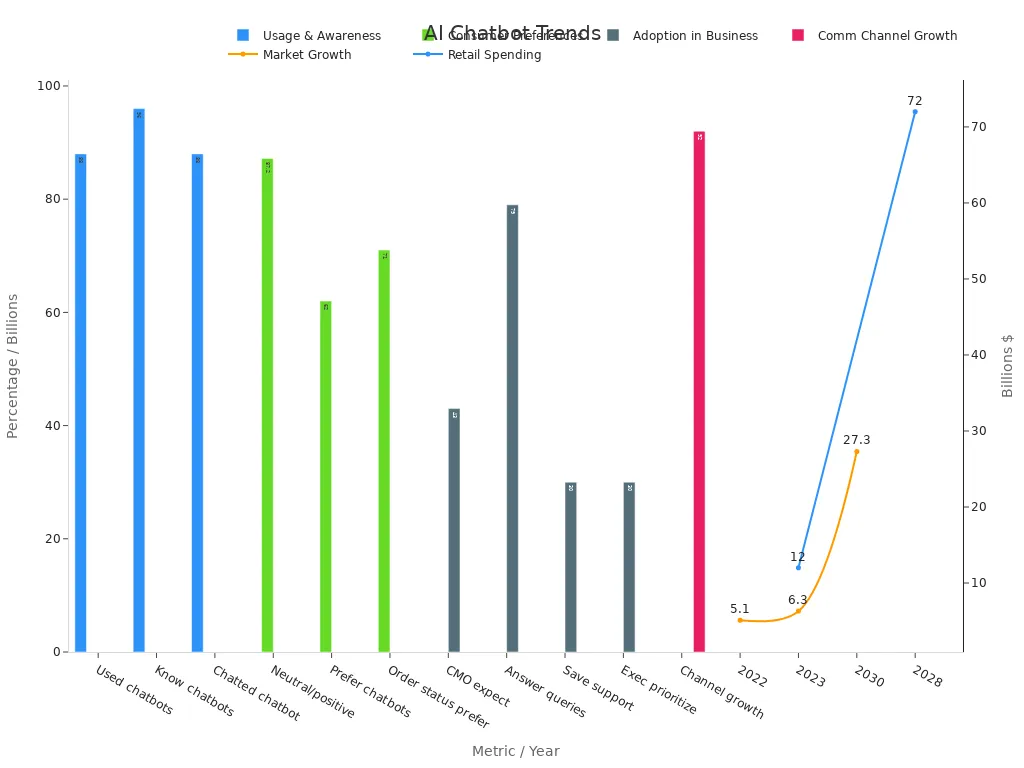
Cost and Efficiency Gains
Enterprises realize significant cost savings and efficiency gains by integrating AI chatbots into business operations. One project saved $500,000 annually and achieved a 150% ROI in the first year by automating Tier-1 inquiries. Companies report up to 91% of repetitive queries resolved without human intervention, reducing staffing needs and speeding up response times. Sobot’s AI chatbot provides 24/7 availability, eliminating overtime costs and supporting global customer bases. Market projections show the AI chatbot industry will exceed $27 billion by 2030, reflecting rapid adoption and measurable financial benefits (source).
Must-Have Features in Chatbot for Enterprises
Natural Language Processing (NLP)
Natural Language Processing stands at the core of every advanced chatbot platform. Enterprises rely on NLP to interpret user intent, manage context, and deliver personalized responses. Research shows that NLP-driven ai chatbots reduce response times from 15 minutes to just seconds and resolve up to 80% of queries without human help. In industries like finance and healthcare, NLP enables chatbots to understand complex requests, detect sentiment, and provide accurate information. Sobot’s chatbot for enterprises uses large language models and machine learning to maintain conversation flow and deliver a seamless conversational experience.
| Industry | Outcome Improvements | Metrics Example |
|---|---|---|
| Customer Service | Faster replies, higher resolution rates | 30% cost reduction, 80% queries resolved |
| E-commerce | Personalized shopping, reduced cart abandonment | 20% higher order value, 15% more retention |
Omnichannel and Multilingual Support
Omnichannel and multilingual support are essential for global enterprise operations. Modern chatbot platforms must provide consistent engagement across web, mobile, and messaging apps. Studies reveal that conversational ai chatbots with these features reduce support ticket volume by 35% and enable 24/7 service. Sobot’s enterprise-grade chatbots interact in over 20 languages, allowing companies to serve customers worldwide. Multilingual chatbots break down barriers, while omnichannel support ensures users can switch devices or channels without losing context.
Tip: Multilingual and omnichannel capabilities help enterprises scale customer support and build brand loyalty.
Integration and Customization
A robust chatbot platform integrates smoothly with enterprise systems such as CRM, ERP, and marketing tools. Integration enables ai chatbots to automate complex tasks, personalize interactions, and optimize workflows. For example, Prowly automated 80% of manual tasks by integrating an AI-driven CRM, boosting conversion rates. Sobot’s chatbot platform offers no-code customization, allowing businesses to tailor workflows and connect with existing tech stacks. Machine learning and AI capabilities further enhance personalization and operational agility.
Security and Compliance
Enterprises demand strict security and compliance from their chatbot platforms. Leading solutions follow industry standards like GDPR and CCPA, use encryption, and conduct regular security audits. AWS and SmythOS validate chatbot security through compliance programs and continuous monitoring. Sobot’s chatbot platform ensures data privacy with multi-factor authentication and least privilege authorization, supporting enterprise compliance needs.
- Regular audits and penetration testing
- Data encryption and privacy-by-design
- Multi-factor authentication
Analytics and Reporting
Analytics and reporting drive continuous improvement for ai chatbots. Key metrics include deflection rate, response time, first contact resolution, CSAT, and conversion rate. Sobot’s conversational ai platform provides real-time dashboards, helping enterprises track performance and optimize chatbot responses. High deflection rates, paired with strong customer satisfaction, lead to cost savings and improved efficiency. Analytics also reveal trends, enabling enterprises to refine their chatbot strategies and deliver better business outcomes.
Top 10 AI Chatbot Solutions for Enterprises 2025
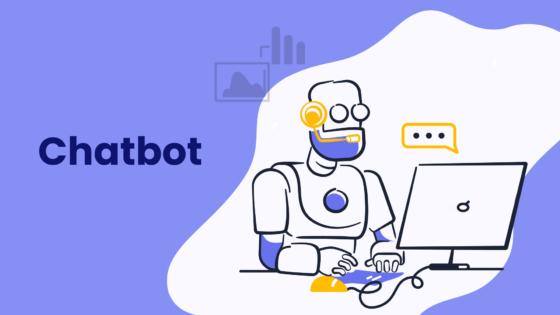
Enterprises in 2025 rely on advanced chatbot platforms to automate workflows, improve customer support, and drive business growth. The following list highlights the best ai chatbots for enterprise needs, focusing on workflow automation, integration, and measurable results.
The chart below shows the popularity of leading ai chatbots by search volume, reflecting their adoption and interest among enterprises.
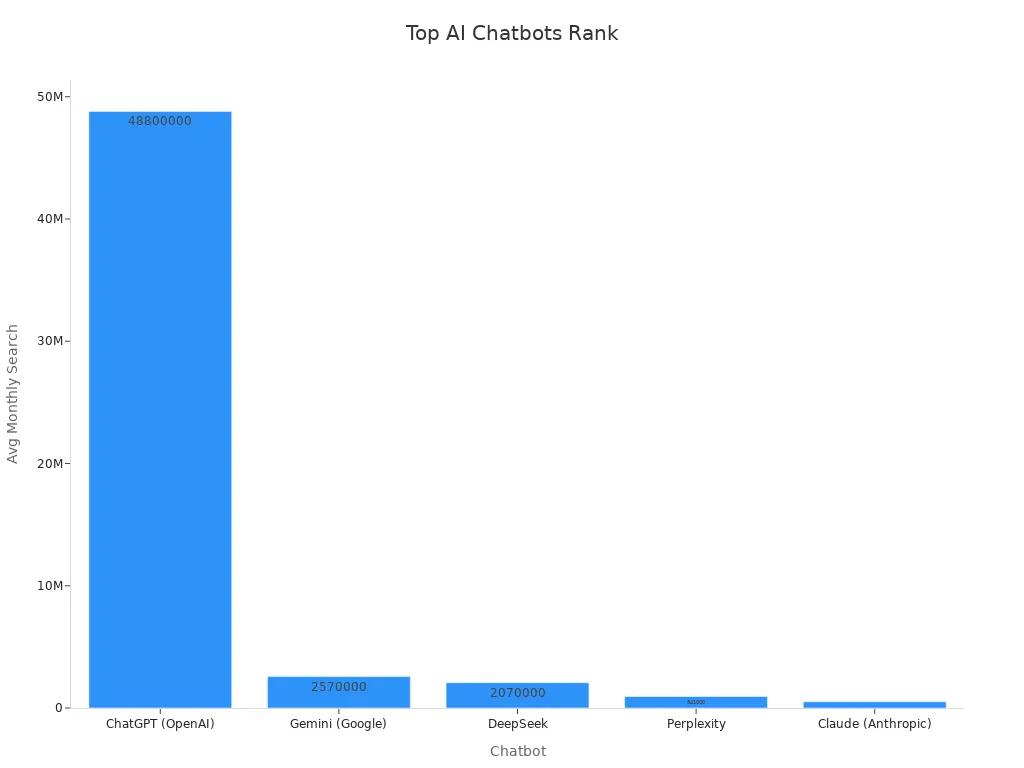
Sobot Chatbot
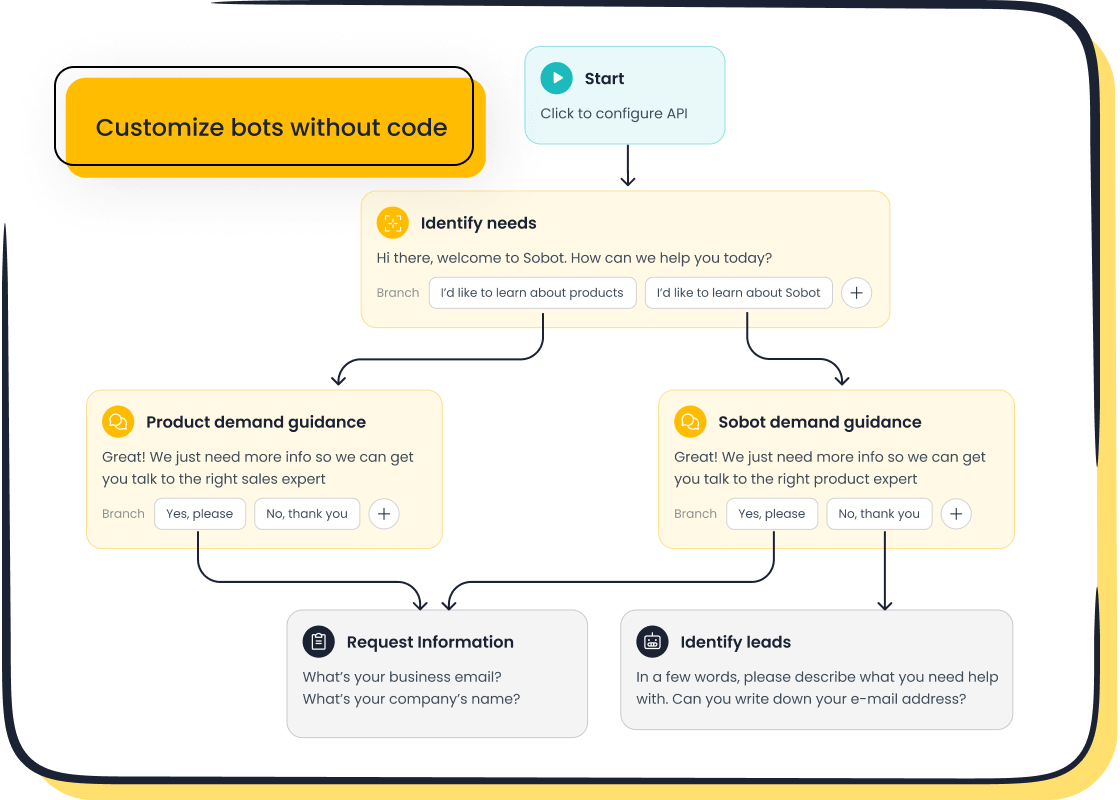
Sobot Chatbot stands out as a top chatbot for enterprises seeking all-in-one automation. This chatbot platform delivers 24/7 multilingual support, omnichannel integration, and no-code workflow design. Sobot’s AI capabilities help businesses automate up to 79% of routine queries, reducing costs by up to 50%. Companies like OPPO achieved an 83% chatbot resolution rate and a 94% positive feedback score after deploying Sobot. The platform’s machine learning engine enables real-time intent recognition and proactive messaging, boosting conversions by 20%. Sobot’s enterprise-grade chatbots fit best for organizations needing secure, scalable, and customizable automation across sales, marketing, and support.
Learn more about Sobot Chatbot
ChatGPT
ChatGPT, powered by OpenAI’s GPT-4o, leads the market in conversational AI. Enterprises use this chatbot platform for natural language understanding, content generation, and workflow automation. ChatGPT supports multimodal inputs, enabling text, image, and voice interactions. Its broad adoption and benchmark performance make it a preferred choice for businesses seeking flexible ai chatbot solutions. ChatGPT fits best for enterprises that need advanced reasoning, creative content, and seamless integration with existing systems.
Google Gemini
Google Gemini offers strong ai chatbot solutions for enterprises that require complex reasoning and deep integration with Google Cloud. This chatbot platform uses multimodal AI to process text, images, and data, supporting advanced workflow automation. Gemini’s visual flow builder and intent recognition help enterprises design sophisticated virtual agents. The platform excels in scenarios where businesses need to connect with Google Workspace, automate support, and analyze customer data at scale.
Microsoft Copilot
Microsoft Copilot integrates with Microsoft 365, Azure, and Dynamics, providing a robust chatbot platform for workflow automation. Enterprises benefit from Copilot’s deep integration, security, and productivity features. Lumen Technologies reported ~$50 million in annual productivity savings and a 20-30% reduction in coding cycle time using Copilot. This solution fits best for organizations already invested in Microsoft’s ecosystem and seeking to automate business processes, document management, and customer support.
| AI Chatbot Solution | Client / Enterprise | Key Performance Metrics / Outcomes |
|---|---|---|
| Microsoft 365 Copilot | Lumen Technologies | ~$50 million annual productivity savings; 4 hours saved per seller weekly; 20-30% reduction in coding cycle time |
| Zoho SalesIQ | LambdaTest | 40% increase in operator efficiency; faster support response times; automatic query redirection via GPT |
| Tidio | Eye-oo (Italian retailer) | €177,000 additional revenue; 25% sales increase; 86% reduction in first-response time; 82% support inquiries resolved |
IBM watsonx Assistant
IBM watsonx Assistant provides ai chatbot solutions with strong security, compliance, and integration features. Enterprises use this chatbot platform to automate customer support, manage workflows, and analyze interactions. Watsonx Assistant leverages machine learning to deliver accurate, context-aware responses. It fits best for regulated industries like finance and healthcare, where data privacy and compliance are critical.
Botpress
Botpress is an open-source chatbot platform designed for enterprises that need flexibility and deep customization. The platform supports workflow automation, integration with CRM and ERP systems, and advanced analytics. Botpress uses modular architecture, making it easy for developers to build and deploy custom ai chatbots. It fits best for organizations with technical teams that want full control over their chatbot for enterprises.
Zendesk Answer Bot
Zendesk Answer Bot helps enterprises automate customer support by resolving common queries and routing complex issues to agents. This chatbot platform integrates with Zendesk’s ticketing and CRM tools, streamlining support workflows. Enterprises benefit from faster response times and reduced ticket volumes. Zendesk Answer Bot fits best for companies using Zendesk’s ecosystem and seeking to enhance customer engagement through automation.
Drift
Drift specializes in conversational marketing and sales automation. Enterprises use this chatbot platform to qualify leads, schedule meetings, and provide instant support. Drift’s ai chatbots engage website visitors in real time, increasing conversion rates and accelerating sales cycles. The platform fits best for B2B organizations focused on lead generation and customer engagement.
Tidio
Tidio offers a user-friendly chatbot platform for enterprises in retail and e-commerce. The platform automates support, manages live chat, and integrates with popular e-commerce tools. Eye-oo, an Italian retailer, used Tidio to achieve a 25% sales increase and resolve 82% of support inquiries automatically. Tidio fits best for businesses seeking quick deployment, multilingual support, and measurable revenue growth.
Zoho SalesIQ
Zoho SalesIQ delivers ai chatbot solutions that combine live chat, automation, and analytics. Enterprises use this chatbot platform to boost operator efficiency and speed up support response times. LambdaTest reported a 40% increase in operator efficiency after implementing Zoho SalesIQ. The platform fits best for organizations looking to unify sales and support, automate query routing, and gain actionable insights.
Tip: Enterprises achieve the best results by training chatbots on high-quality customer data, involving support teams early, and monitoring satisfaction KPIs. Seamless handoffs to human agents ensure complex queries receive expert attention.
| AI Chatbot / Model | Average Monthly Search Volume (Last 3 Months) | Key Strengths / Features |
|---|---|---|
| ChatGPT (OpenAI) | ~48,800,000 | Market leader, broad adoption, top benchmark performance, multimodal GPT-4o model |
| Gemini (Google) | ~2,570,000 | Complex reasoning, strong Google Cloud integration, multimodal capabilities |
| DeepSeek | ~2,070,000 | Rapid growth, smart but with latency issues due to infrastructure scaling |
| Claude (Anthropic) | ~516,000 | Ethical guardrails, longer context windows, favored in developer tools (25% usage share on OpenRouter) |
| Perplexity | ~941,000 | Search-first AI tool, user-friendly app, supports multiple models |
| Microsoft Azure Bot Service | N/A | Scalable, secure enterprise platform, integrates with Azure AI services |
| Google Dialogflow | N/A | Visual flow builder, intent recognition, enterprise-grade virtual agents |
| Rasa | N/A | Open-source, flexible, context-aware AI assistants for integration and automation |
| Others (e.g., Nova, Llama, Kimi) | Lower volumes, emerging or niche players | Various specialized or open-source models |
The best ai chatbot solutions for 2025 empower enterprises to automate workflows, improve customer support, and drive measurable business outcomes. Each chatbot platform offers unique strengths, making it important for organizations to match their needs with the right solution.
Comparing the Best AI Chatbots
Feature Comparison Table
Enterprises often evaluate the best ai chatbots by comparing their core features and performance metrics. The following table highlights how leading chatbot platforms impact sales, customer engagement, and business operations across industries:
| Feature / Metric | Statistic / Benchmark | Use Case / Industry Context |
|---|---|---|
| AI chatbots reduce SDR workload | 2x reduction in workload | Sales Development Representatives |
| Sales conversion improvement | 3x better conversion vs. website forms | Sales and lead conversion |
| Generative AI chatbot conversion boost | 2.5x increase in sales conversion | Lead qualification and scoring |
| Lead qualification via chatbot quiz | 20% better results than static lead forms | Lead qualification |
| Customer preference for AI chatbots | 50% prefer talking with AI chatbots | Customer engagement |
| eCommerce revenue boost | 7-25% increase in revenue | eCommerce |
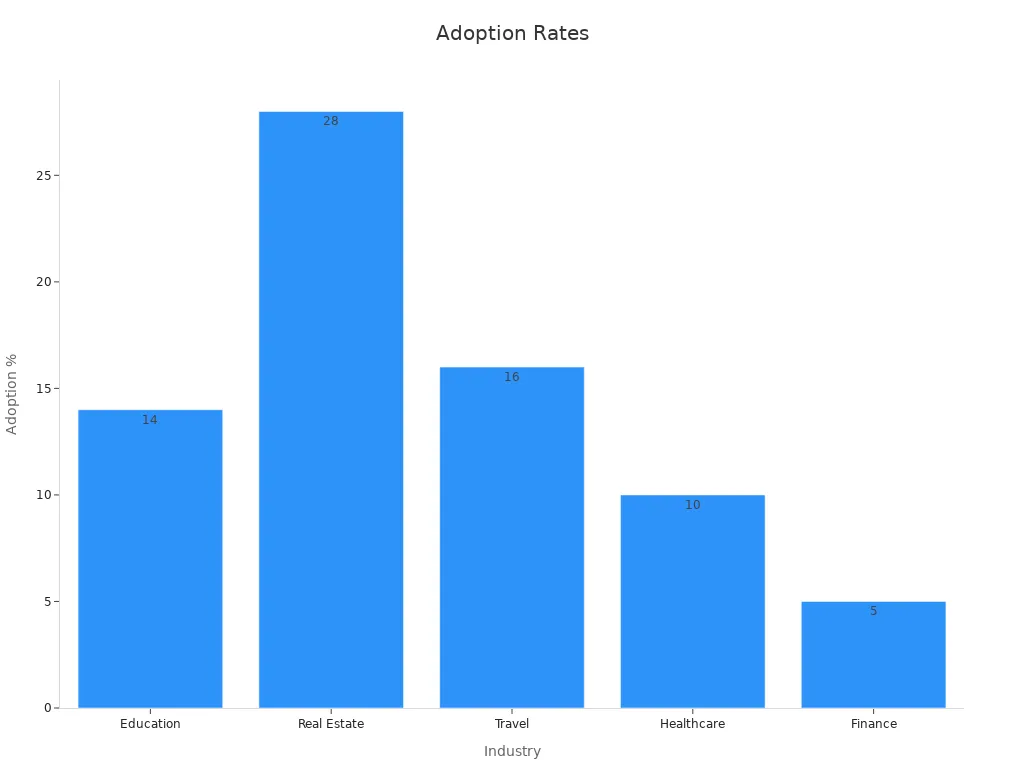
Sobot’s chatbot platform stands out by offering omnichannel support, multilingual capabilities, and seamless integration with marketing tools. These features help enterprises automate workflows and improve customer satisfaction.
Pros and Cons Overview
The best ai chatbots deliver 24/7 availability, quick responses, and significant cost savings. Sobot’s chatbot platform, for example, enables easy deployment and customization without coding. Many platforms support over 50 languages, making them ideal for global marketing campaigns. However, some users report that chatbots may misinterpret slang or complex queries. Only 34% of online retail customers feel comfortable interacting with chatbots, showing that user acceptance remains a challenge. Ongoing maintenance and updates are also necessary to keep chatbot platforms effective.
Tip: Enterprises should combine chatbot automation with human support to handle complex issues and maximize customer satisfaction.
Industry Use Cases
AI chatbots now power a wide range of industry solutions. In insurance, Lemonade’s Maya processes claims in seconds, automating policy management. Plantix in agriculture diagnoses crop diseases instantly, helping farmers improve yields. In travel, Expedia’s chatbot platform offers 24/7 booking support and personalized recommendations. Sobot’s chatbot platform helps retail and e-commerce brands automate marketing, qualify leads, and boost revenue by up to 25%. In education, chatbots like Pounce guide students through admissions, reducing drop-off rates.
| Industry | Company / Product | Use Case Description |
|---|---|---|
| Insurance | Lemonade (Maya) | Automates claims and policy purchases in seconds. |
| Agriculture | Plantix | Diagnoses crop diseases and recommends treatments. |
| Travel | Expedia (ChatGPT bot) | Provides 24/7 support and booking assistance. |
| Education | Georgia State (Pounce) | Guides students through admissions and financial aid. |
| Retail/E-commerce | Sobot Chatbot Platform | Automates marketing, lead qualification, and customer support, increasing revenue and efficiency. |
Enterprise AI Chatbot Development and Selection
Selecting and implementing the right enterprise ai chatbot development strategy ensures long-term business success. Enterprises should follow a structured approach to maximize the value of their chatbot platform.
Define Business Goals
Enterprises must start by defining clear objectives for their enterprise ai chatbot development. Common goals include reducing support costs, increasing lead conversion, or improving customer satisfaction. For example, Sobot helped OPPO achieve an 83% chatbot resolution rate and a 94% positive feedback score by aligning chatbot objectives with business needs. Setting measurable KPIs, such as response time or conversion rates, guides the project toward tangible results.
Assess Integration Needs
Integration forms the backbone of effective enterprise ai chatbot development. Enterprises should connect the chatbot platform with e-commerce systems, CRM, payment processors, and communication channels. Sobot’s chatbot platform integrates seamlessly with popular business tools, enabling real-time product updates and order processing. Integration supports automation across sales, marketing, and support, streamlining operations.
Test Usability and Experience
Testing ensures the chatbot platform delivers a smooth user experience. Enterprises should conduct functional, scenario-based, and language comprehension tests. Metrics like conversion rates, lead qualification scores, and customer satisfaction reveal the chatbot’s impact. Sobot’s phased deployment and onboarding process, as seen with OPPO, helps teams adapt quickly and ensures high adoption rates.
Tip: Involve both employees and customers in user acceptance testing to identify improvement areas early.
Evaluate Security and Compliance
Security and compliance remain critical in enterprise ai chatbot development. Enterprises must verify that the chatbot platform supports data encryption, GDPR compliance, and regular security audits. Sobot’s platform offers multi-factor authentication and privacy-by-design features, protecting sensitive business data.
Plan for Scalability
Scalability allows enterprises to handle growth without disruption. The chosen chatbot platform should support increasing conversation volumes and new channels. Sobot’s enterprise-grade solutions process millions of interactions daily, ensuring reliable performance as business needs evolve.
Review Pricing and ROI
Enterprises should evaluate pricing models and expected ROI before finalizing their enterprise ai chatbot development plan. Studies show that chatbots can reduce operational costs by up to 30% and boost revenue by 7-25% annually (source). Sobot’s transparent pricing and proven ROI, as demonstrated in OPPO’s case, help enterprises make informed decisions.
| Area | Success Metrics | ROI Indicators |
|---|---|---|
| Customer Service | 83% resolution rate, 94% positive feedback | 30% cost reduction, 7-25% revenue increase |
| Marketing & Sales | 20% higher conversion, 30% more leads | Shorter sales cycles, higher qualification rates |
Enterprises that follow these steps in their enterprise ai chatbot development journey achieve measurable improvements in efficiency, customer satisfaction, and business growth.
Sobot Chatbot stands out as the best AI chatbot for enterprises to automate workflows in 2025. Enterprises using Sobot’s AI chatbot report up to 83% resolution rates and 94% positive feedback, as seen with OPPO. Automating workflows with the right AI chatbot boosts customer service, increases efficiency, and drives business growth. Sobot’s chatbot for enterprises offers secure, scalable automation and supports omnichannel engagement. Companies seeking the best AI chatbot solution should evaluate their needs and consider Sobot for enterprise AI chatbot development.
Discover more about Sobot’s AI chatbot for enterprises at sobot.io.
FAQ
What makes Sobot the best AI chatbot for enterprises in 2025?
Sobot delivers 24/7 workflow automation, supports over 20 languages, and integrates with major business systems. OPPO achieved an 83% chatbot resolution rate and a 94% positive feedback score using Sobot. These results show why many call it the best AI chatbot for enterprises.
How does a chatbot for enterprises improve workflow automation?
A chatbot for enterprises automates repetitive tasks, such as order processing and customer support. Sobot’s AI chatbot reduces manual workload by up to 70%. This automation allows teams to focus on complex projects, increasing productivity and efficiency across departments.
Can Sobot’s AI chatbot integrate with existing enterprise systems?
Yes. Sobot’s chatbot for enterprises offers seamless integration with CRM, ERP, and marketing tools. The no-code interface enables quick setup. Enterprises can automate workflows without technical barriers, ensuring smooth operations and data consistency.
Is Sobot’s AI chatbot secure and compliant for enterprise use?
Sobot’s AI chatbot follows strict security protocols, including data encryption and GDPR compliance. Regular audits and multi-factor authentication protect sensitive information. Enterprises trust Sobot for secure workflow automation and reliable chatbot for enterprises solutions.
How does Sobot’s chatbot for enterprises support global teams?
Sobot’s AI chatbot provides multilingual support and omnichannel engagement. Enterprises can serve customers worldwide, switching between channels like WhatsApp, SMS, and web chat. This flexibility ensures consistent workflow automation and customer satisfaction across regions.
Tip: Enterprises using the best AI chatbot for workflow automation report up to 30% cost savings and higher customer satisfaction.
Learn more about Sobot’s enterprise solutions.
See Also
Simple Steps To Deploy Effective Website Chatbots
How To Select The Ideal Chatbot Software Solution
Leading Ten Chatbots For Websites In The Year 2024
